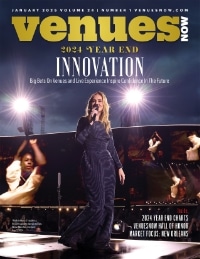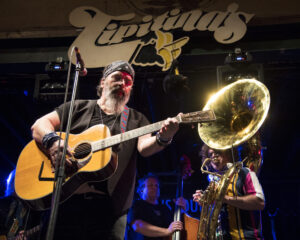ON A CORNER IN TUCSON, ARIZONA: Rendering shows future vision of Fox Tucson Theatre complex. (Courtesy venue)
Expansion Project Takes Major Step Forward
Bold vision is shifting into practical reality at the Fox Theatre and the corner of Congress Street and Stone Avenue in downtown Tucson, Arizona.
Plans to expand the 1,164-seat theater, which was built in 1930, onto a broader campus received a major boost at the end of 2022 when the Fox Tucson Theatre Foundation closed on the purchase of the theater at 17 West Congress from Rio Nuevo downtown redevelopment and revitalization district.
Along with the theater itself, the foundation also purchased the Arizona Star Building at 30 North Church Avenue, which houses the organization’s administrative offices and a strip of property that connects the two buildings and includes the theater’s loading dock.
On Dec. 28, the foundation closed on the purchase of the properties along Stone Avenue immediately adjacent to the theater, including the now-unoccupied, former Bruegger’s Bagels downtown location as well as 13, 17, 25 and 27 N Stone Avenue (three empty storefronts and the current location of Rae’s Place Downtown Market), connecting Congress north along Stone Avenue to the Bank of America building.
“In many ways, this opportunity arose without any of us thinking it was going to arise,” said Bonnie Schock, the theater’s executive director. “The unbelievably perfect nature of the opportunity made our board and I just ready to go, go, go and seize it. We knew we had to do this for the future of the organization.”
In addition to approving the purchases, the Fox board of directors authorized the launch of the a capital campaign aimed at raising an initial $21 million over three to five years. The foundation has received a $2 million matching pledge from Rio Nuevo, which is a public entity. The campaign is being led Laura Alexander and Phoebe Chalk-Wadsworth of Alexander|Carrillo Consulting.
The idea is to develop a theater-anchored complex capable of hosting a wider array of events than the current mix of high-quality music, smaller-scale performing arts with an emphasis on local producers and artists, according to Schock.
Board President Brent Davis, referring to the theater in a news release as “the Crown Jewel of Tucson,” said the development would secure the legacy of the historic venue while offering audiences “greater artistic program diversity, next-level patron services, dynamic food and beverage experiences, and much more; all in ways that complement and extend what the Tucson community loves about the irreplaceable historic treasure.”
“It is beyond wishful thinking at this point,” Schock said. “We’ve purchased the property, a capital campaign has been launched, we have a lead gift investment, though there’s still a lot of work to do.”
Even before purchasing decisions were finalized, the vision for the theater was on display in public meetings, and a number of other historic theater projects were looked at in the feasibility study process, Schock said.
Plenty of evidence exists on the potential impact a restored historic can have in a downtown core. The Fox Tucson underwent a renovation project 20 years ago that brought the theater back as a live performance venue, Schock said. Concerts taking place in 2022 at the venue include The Wallflowers, Three Dog Night, Ryan Adams, and Lyle Lovett.
“The operating model for successful performing arts facilities is to diversify,” she said. “The original renovation that brought the Fox back from a movie palace to a live event center, the physical space is conducive to one thing. It’s a formal presentation space with almost no lobby space.”
The lobby is long and narrow, with barely enough space to get a drink, let alone hold a reception, Schock said.
“There’s not enough room for all the kinds of expanded experiential evenings that contemporary audiences want,” she said. “The operating model now is for the long-term sustainability of the organization.”
The stage house and back of house will not change, but everything around it will, Schock said.
“When we look at where we belong in this ecosystem, growing our number of seats or growing our stage house doesn’t make sense to us,” she said. “What makes sense is providing the kind of patron experience and the ability to serve a variety of smaller-capacity artists both locally and nationally that will make a real difference for us.”
The theater is not a Broadway house. That niche is filled by the Centennial Hall on the campus of the University of Arizona, which is used by Broadway Tucson, a Nederlander enterprise.
“We’re not interested in entering into that market in competition with an existing, high-quality Broadway touring presenter,” Schock said, adding that an emphasis for the Fox is on local and regional producers and organizations.
Schock admits that reaching the initial fundraising goal is a challenge.

Bonnie Schock (Courtesy venue)
“If I didn’t feel like it was a stretch, then I really wouldn’t be doing my job,” she said. “It is a stretch for the community, but it’s an essential stretch. The Fox is an iconic organization in Tucson. It’s part of the cultural identity; part of the space and place here in the desert.”
Schock said the Tucson area is a fast-growing region economically despite the setbacks of the pandemic, but there is a severe wealth gap and those on the short end suffered most.
“Our downtown has recovered extraordinarily,” she said, noting that her first day on the job was March 9, 2020, three days before the venue shut down. “It was devastated and now it’s shot back up.”
The Fox has a core audience age 50 and up, and they’ve returned to the theater in force, with an uptick in attendance from pre-pandemic levels.
“We’re not subscription-based, we’re event-based,” Schock said. “We’ve made some choices in our programming as a presenter and we haven’t been as hard hit, but we are working very hard marketing-wise to make sure those seats are filled.”
The theater expansion project will allow for still more differentiation from other venues in town.
“We’re still in design phases but in one form or another we’ll have a roughly 200-capacity space added to the facility that should be a flexible multi-use space that can be seated informally. It could be jazz club seated, sit-down dinner seated it could be stand-up DJ party type events,” she said. “That will provide us with lots of flexibility that we don’t currently have on this very formal, 1,200-seat, proscenium auditorium.”
There will also be a rooftop bar that will be the full length of the venue.
“In that space, we imagine being able to do open-mic nights and local music before and after shows; a range of different things that will provide lots of opportunities for artists that we currently cannot serve in the community,” Schock said.








